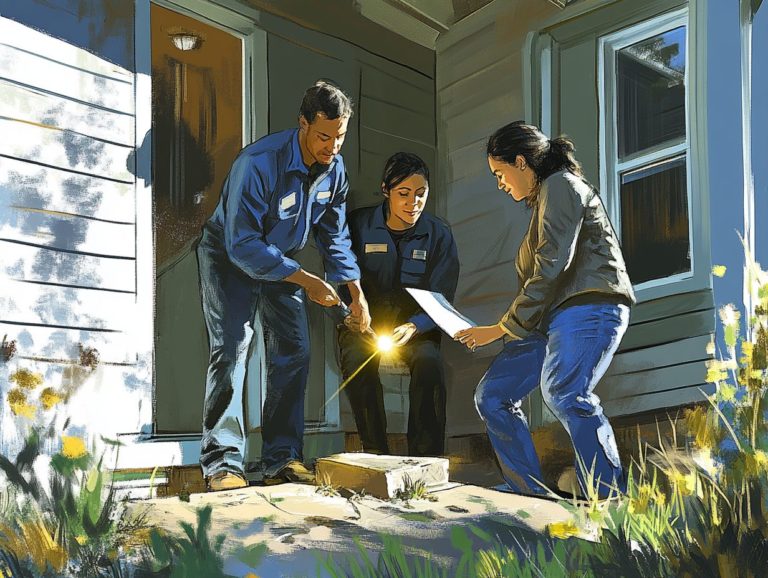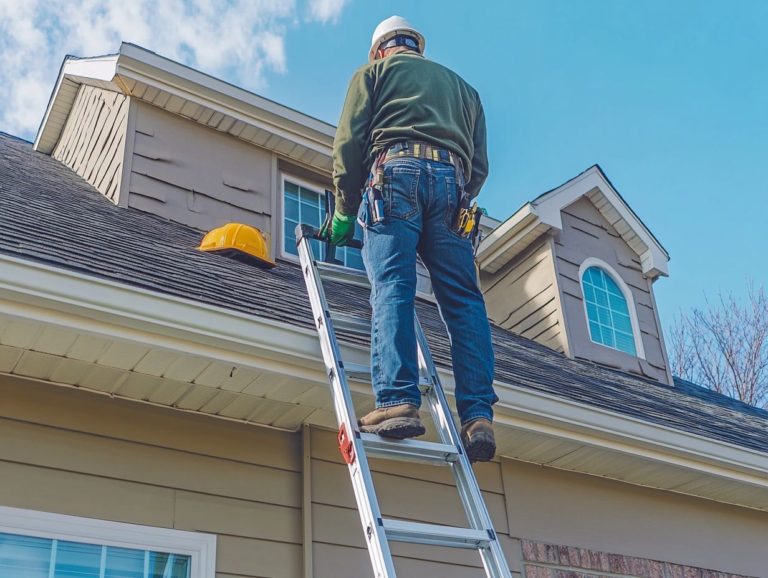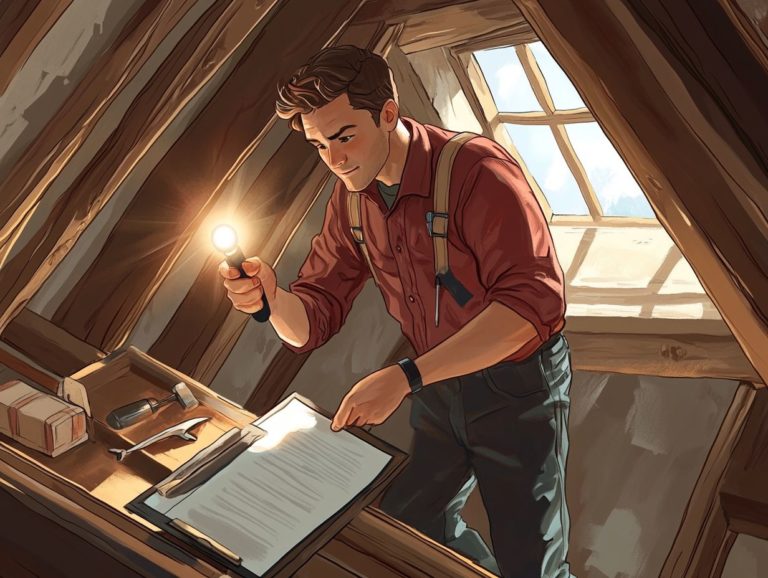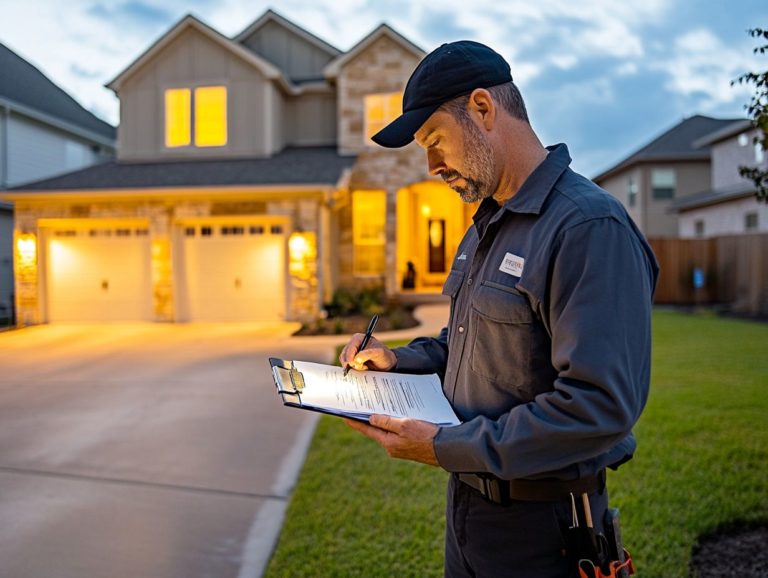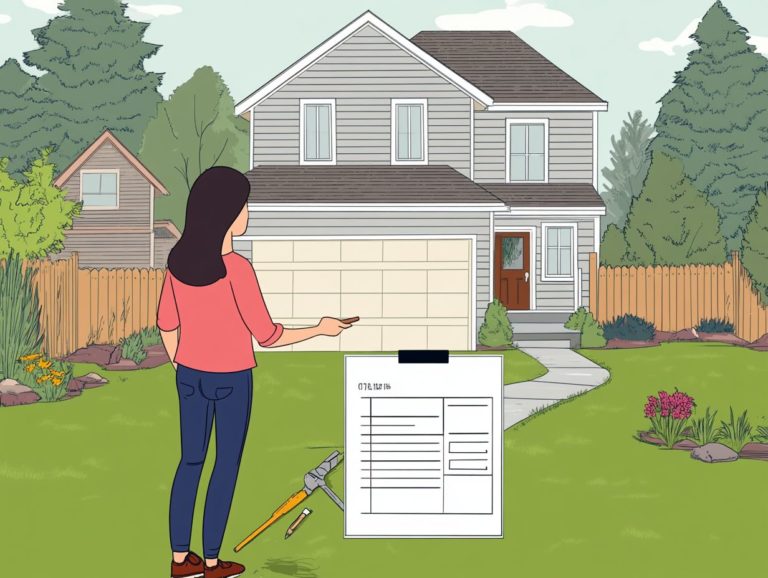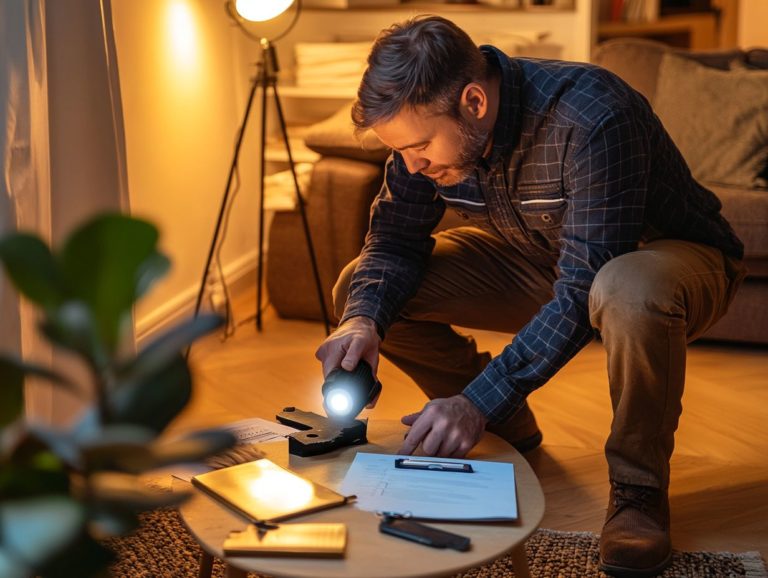How to Choose the Right Home Inspector for Your Property
Choosing the right home inspector is vital when you’re buying or selling a property. A comprehensive inspection can reveal hidden issues, saving you time and money.
This guide explains the role of a home inspector, key qualities to look for, and essential questions to ask. It also helps you research and compare inspectors, plus offers tips for preparing for an inspection.
By the end of this guide, you’ll feel ready and excited to choose the right inspector for you!
Contents
- Key Takeaways:
- Understanding the Role of a Home Inspector
- Qualities to Look for in a Home Inspector
- Questions to Ask a Potential Home Inspector
- Researching and Comparing Home Inspectors
- Preparing for a Home Inspection
- Final Thoughts on Choosing the Right Home Inspector
- Frequently Asked Questions
- What should I look for when choosing a home inspector?
- How do I find a reputable home inspector?
- What certifications should a home inspector have?
- How much does a home inspection typically cost?
- What are some red flags to watch out for when choosing a home inspector?
- Is it necessary to be present during the home inspection?
Key Takeaways:
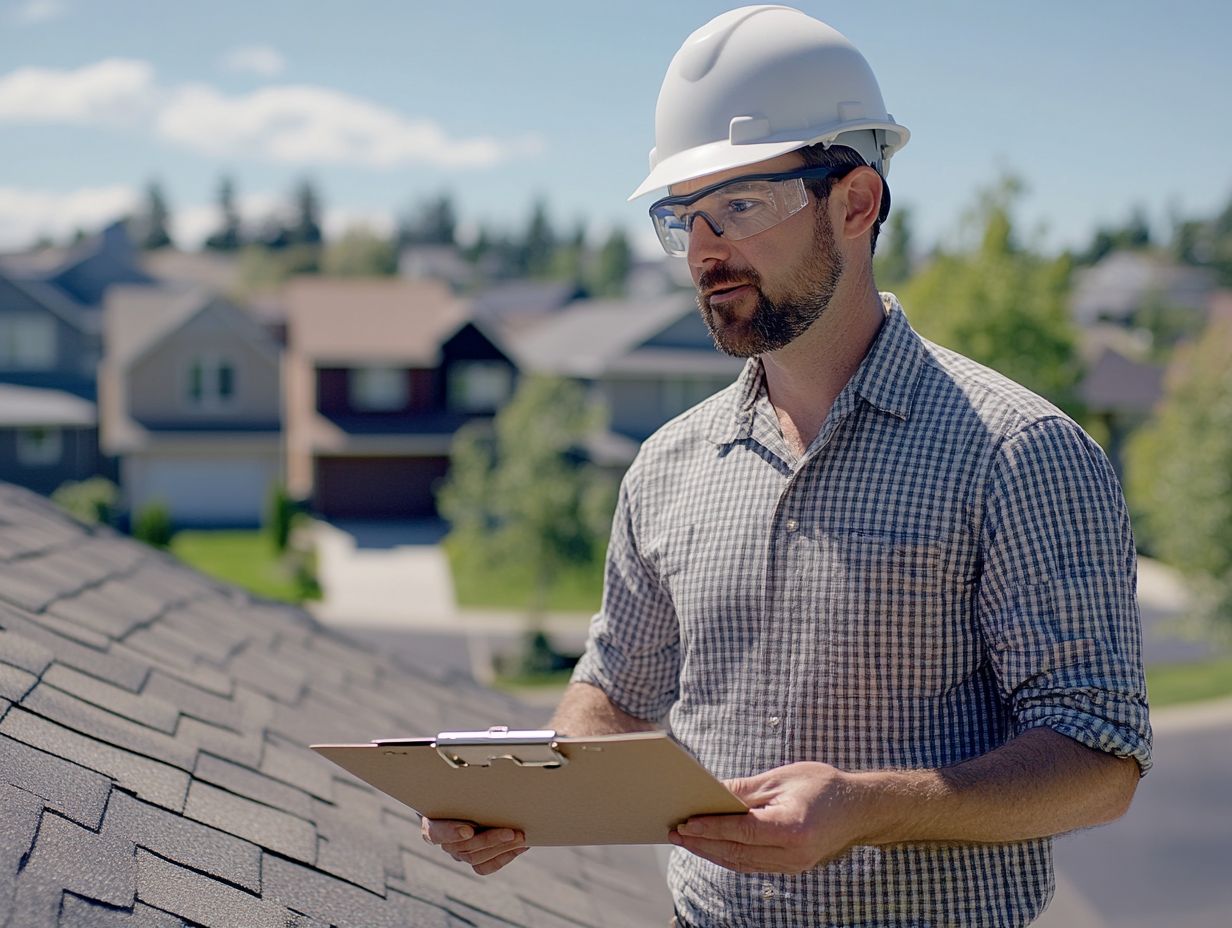
Understanding the Role of a Home Inspector
A home inspector plays a key role in your homebuying journey. They provide a detailed evaluation of a property s condition, highlighting important parts like the building’s structure, mechanical issues, and potential pest problems.
A qualified home inspector uses advanced tools, like a special camera that detects heat, to find hidden issues. This helps you make informed decisions during the home purchase process.
What is a Home Inspector?
A home inspector evaluates a property’s condition, identifying issues that could affect safety and value. They follow guidelines from organizations like the American Society of Home Inspectors to ensure quality service.
Before hiring, check the Better Business Bureau to confirm their reputation. Qualified inspectors complete training programs and may earn certifications to show their expertise.
During an inspection, they assess key areas like the roof, plumbing, and electrical systems. Their reports detail findings and provide repair recommendations with estimated costs.
Home inspectors help you make informed decisions in the competitive real estate market, influencing negotiations on fees and repairs.
Qualities to Look for in a Home Inspector
When choosing a home inspector, consider key qualities for a thorough assessment. An experienced inspector understands mechanical issues and pest infestations, displaying careful attention to detail. For more guidance, check out how to choose the right inspector for your needs.
Effective communication skills are essential. A good inspector clearly conveys their findings, helping you understand any concerns from the inspection.
Start your search today and get the peace of mind you deserve!
Experience and Credentials
When selecting a home inspector, your priority should be their experience and credentials. Knowing how to spot a good home inspector can significantly influence the reliability of the inspection results.
As a prospective homebuyer, look for inspectors with substantial field experience and certifications from reputable organizations. This ensures they can identify issues like structural concerns and pest infestations.
Inspectors who use advanced techniques, such as thermal imaging, can uncover hidden problems that less experienced inspectors might overlook. This further highlights the need to evaluate an inspector’s qualifications.
Memberships in respected associations, like the American Society of Home Inspectors (ASHI), bolster an inspector s credibility. This signals their commitment to ongoing education and adherence to high standards.
You can verify an inspector s credentials through platforms like the Better Business Bureau. This not only provides ratings but also reveals any complaints lodged against the inspector.
Practical knowledge gained from years of experience is essential for conducting thorough inspections. This enables the inspector to navigate complex issues with skill.
Choose a qualified inspector to secure your investment and gain peace of mind!
Attention to Detail
Attention to detail is crucial for a home inspector. Even the smallest oversight can significantly impact the property s condition and the homebuyer s investment.
A meticulous approach means thoroughly examining every facet of a property, from structural concerns to electrical systems, plumbing, and heating, ventilation, and air conditioning systems. This ensures no potential issues slip through the cracks.
This level of diligence helps identify existing problems and assists homebuyers in grasping the true value and safety of the property.
Foundational integrity is paramount for your evaluations. Be vigilant in checking for cracks or shifts that could signal serious structural issues.
The roof’s condition is equally important not just for its visual appeal but for its role in preventing leaks that could lead to expensive repairs later.
A thorough assessment of ventilation systems is vital. Inadequate airflow can foster mold growth and compromise indoor air quality.
Focusing on these key areas protects your clients’ investments and ensures a smooth transition into homeownership.
Communication Skills
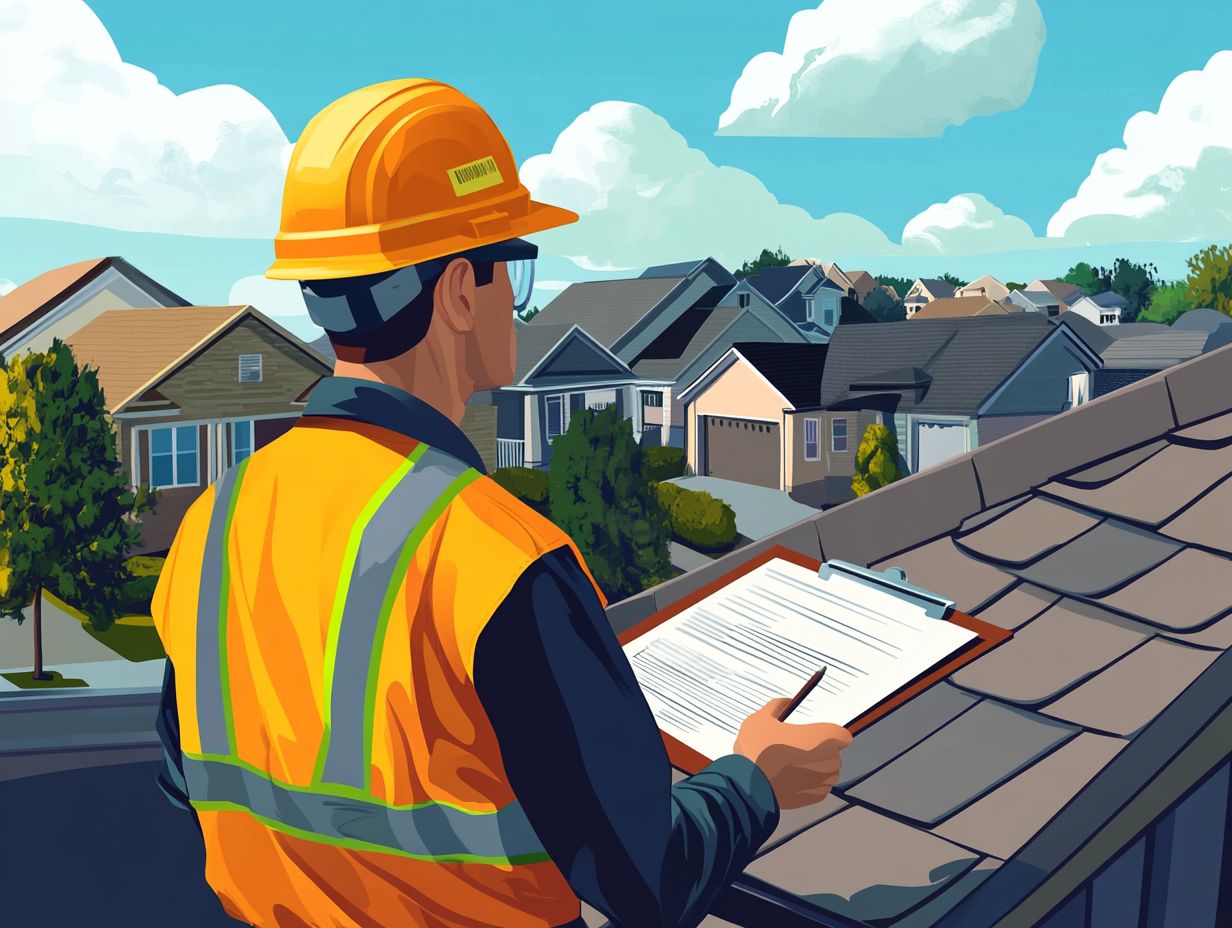
Strong communication skills are essential for you as a home inspector. You must convey your findings effectively to both homebuyers and real estate agents.
When you articulate technical issues clearly and concisely, you ensure that buyers fully grasp the implications of any structural concerns or mechanical problems that arise during the inspection.
A well-organized inspection report that summarizes your findings in layman’s terms can significantly enhance the experience for homebuyers. This makes it easier for them to negotiate necessary repairs or adjustments.
Maintaining transparent dialogue throughout the inspection process fosters trust and collaboration between you and your clients. This trust is vital, as buying a home is often one of the most significant investments in a person s life.
By providing clear and actionable insights, you enable potential buyers to make informed decisions. This allows them to navigate purchase contracts with confidence.
When you explain your observations and recommendations, you reinforce your role as a valuable ally in their home-buying journey, helping them tackle any issues proactively.
Questions to Ask a Potential Home Inspector
When you’re evaluating a potential home inspector, asking the right questions can reveal crucial insights into their qualifications and the services they provide. For guidance, check out how to select a home inspector for your needs. This ultimately ensures a thorough and trustworthy inspection.
Explore their background and experience, especially any specialization in structural issues or pest infestations. It’s also essential to grasp their pricing structure, along with any supplementary tests they might offer, such as radon or lead testing.
Don t hesitate to request a sample inspection report. This will allow you to assess the quality and thoroughness of their documentation.
Take the time to ask these questions. The right inspector can make all the difference in your home-buying journey, just like knowing how to choose the right real estate agent for you!
Background and Experience
Understanding a home inspector’s background and experience is essential when selecting the right professional to evaluate your property. You want a qualified home inspector who holds relevant certifications and has a proven track record. For more guidance, check out this article on how to choose the right home inspector for you, which highlights the importance of extensive training in spotting potential issues like structural concerns, mechanical problems, and pest infestations.
Their familiarity with various property types and building codes significantly enhances the quality of the home inspection process.
The importance of these credentials cannot be overstated; they form the bedrock of the inspector’s ability to deliver an accurate assessment. Certifications often signify specialized training that equips the inspector with the skills needed to tackle complex inspection scenarios.
Their expertise uncovers hidden issues and gives you confidence in your investment.
As you navigate the often overwhelming purchasing process, a knowledgeable inspector can provide essential insights, enabling you to make informed decisions based on the true condition of the property.
Services and Pricing
Choosing the right home inspector is essential for your peace of mind. It’s crucial to understand the variety of services they offer and their associated pricing, as this can significantly shape your home inspection experience. For more guidance, check out how to choose the right inspector for your home.
Many home inspectors provide a variety of services, from standard inspections to specialized tests like thermal imaging, a method that uses heat sensors to find problems, and radon testing. This enables you to uncover hidden issues that might otherwise go unnoticed.
Transparent pricing is equally important; it allows you to budget effectively, ensuring you receive a thorough evaluation without any unexpected costs.
Investing in those extra tests enhances the reliability of the inspection and offers you peace of mind by addressing specific concerns that a standard evaluation may overlook.
For instance, radon testing can reveal harmful gas levels, while thermal imaging can pinpoint insulation deficiencies or leaks. Different inspectors may adopt varying pricing structures, from flat fees to charges based on square footage, making it essential for you to compare and analyze your options based on the depth of service provided.
Ultimately, the value you gain from a comprehensive home inspection can far exceed the initial costs, protecting you from future expenses and potential heartache.
Sample Inspection Report
A sample inspection report is an essential tool for assessing a home inspector’s expertise and the quality of their evaluations. By reviewing a sample inspection report, you can gauge how thoroughly the inspector documents their findings and recommendations on issues such as structural concerns, pest infestations, and necessary repairs.
This report should clearly outline the condition of various components of the property and provide actionable advice to help you navigate the home purchasing process.
Along with detailed descriptions of the property’s condition, a high-quality report should include photographs that visually document what was observed, making it easier for you to grasp potential issues.
Improvement suggestions are equally important, as they guide you on how to address any problems identified during the inspection. Clear documentation is vital for smooth negotiations between you and the seller, as it provides concrete evidence to support discussions about repairs or price adjustments, ultimately leading to a smoother transaction.
Researching and Comparing Home Inspectors
Researching and comparing home inspectors is vital for you as a homebuyer aiming for a comprehensive evaluation of the property you plan to purchase. Knowing how to find a qualified home inspector can make all the difference.
One of the most effective ways to assess an inspector’s credibility is by looking into online reviews, which include testimonials and ratings from previous clients.
Seeking recommendations from real estate agents can offer invaluable insights; they typically have experience with a range of home inspectors and can guide you toward those with strong reputations, as well as help you understand how to choose the right real estate agent.
Consulting the Better Business Bureau can reveal any complaints about a potential inspector.
Don’t wait! Start comparing home inspectors today to protect your future investment.
Online Reviews and Recommendations
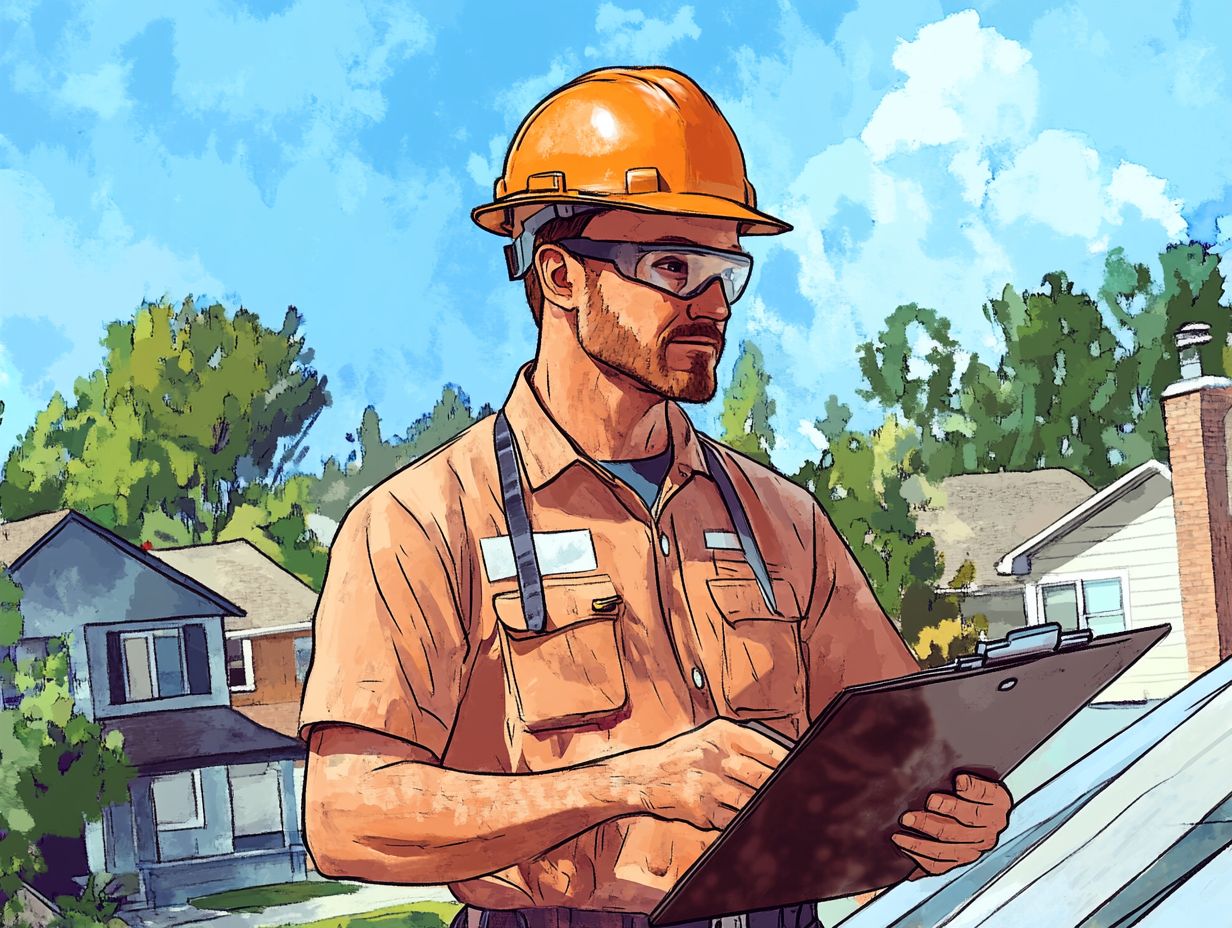
Online reviews and recommendations are crucial for assessing a home inspector’s reliability and quality of service, guiding you in making informed decisions.
By examining customer feedback on platforms like Google, Yelp, and Angi, you can spot patterns in the inspector’s performance concerning thoroughness, professionalism, and overall satisfaction.
Personal recommendations from friends, family, or real estate agents can further enhance your understanding, providing trustworthy insights that bolster your confidence in the selection process.
As you read these reviews, it s important to focus on specific elements like the inspector s attention to detail, responsiveness to inquiries, and the clarity of their reports.
Look for recurring themes that highlight both positive experiences and potential red flags. Balancing these online insights with personal referrals is crucial, as direct experiences often offer context that broad reviews may miss.
Combining online reviews with personal referrals boosts your confidence and helps you make a better choice, ultimately leading to a more satisfactory home inspection experience.
Referrals from Real Estate Agents
Referrals from real estate agents can prove invaluable for you as a homebuyer in search of a reliable home inspector. These agents often possess firsthand experience working with various professionals in the field, allowing them to recommend inspectors who consistently deliver thorough evaluations and have a good track record of finding problems, such as structural concerns and pest infestations.
This insider knowledge can direct you toward inspectors who meet industry standards and understand local market nuances that may influence their evaluations.
By fostering a relationship with a knowledgeable real estate agent, you can tap into a wealth of resources within their professional network. Agents are typically well-connected, offering insights not only into inspectors but also into other critical services like contractors and appraisers all of which can streamline your buying process.
Informed referrals lead to more accurate property evaluations, enabling you to make confident decisions. This collaborative approach enhances your overall homebuying experience while minimizing the potential for costly surprises down the line.
Preparing for a Home Inspection
Getting ready for a home inspection is vital for your journey as a homebuyer. Don’t underestimate its importance! It s your opportunity to ensure the evaluation not only goes smoothly but also comprehensively addresses any potential structural concerns.
Familiarizing yourself with what to expect during the inspection will serve you well understanding the inspector s typical process is key. They will conduct a thorough examination of various components of the property, including mechanical systems, roofs, and foundations.
By taking the time to address minor issues beforehand, you can create a more favorable environment for the inspector, ultimately setting the stage for a more positive evaluation.
What to Expect and How to Prepare
During a home inspection, you can expect a meticulous examination of the property, covering everything from heating, cooling, and plumbing systems to structural concerns and the general condition of the home.
To prepare effectively, it s wise to communicate with your chosen home inspector about any specific issues you want them to address, while also familiarizing yourself with the home s layout and any existing concerns. This proactive approach not only streamlines the inspection process but also enriches your understanding of the property’s overall condition.
Particular attention is often directed toward critical areas such as the roof, plumbing, electrical systems, and the foundation.
You are encouraged to shadow the inspector, taking notes and asking questions as findings arise, which can lead to deeper insights. An engaged buyer like you might inquire about the implications of any red flags identified or the age and upkeep of essential systems.
This dialogue not only clarifies the current state of the home but may also provide context on future maintenance needs, enabling you to make informed decisions as you move forward.
Final Thoughts on Choosing the Right Home Inspector
Choosing the right home inspector is crucial, as it can greatly affect your homebuying experience and long-term happiness with your property. For guidance, check out how to choose the right home inspector for your property.
Take your time to evaluate multiple inspectors. Consider their experience, communication skills, and the thoroughness of their services.
A qualified inspector provides insights into the property’s condition. They help you negotiate repairs or lower prices, giving you peace of mind.
Research is vital. Seek recommendations, read reviews, and ask inspectors about their methods and past experiences.
Effective communication builds trust. An inspector who answers your questions boosts your confidence in the process.
By prioritizing quality and thoroughness, you protect your investment. This paves the way for a secure and satisfying homeownership experience.
Frequently Asked Questions
What should I look for when choosing a home inspector?
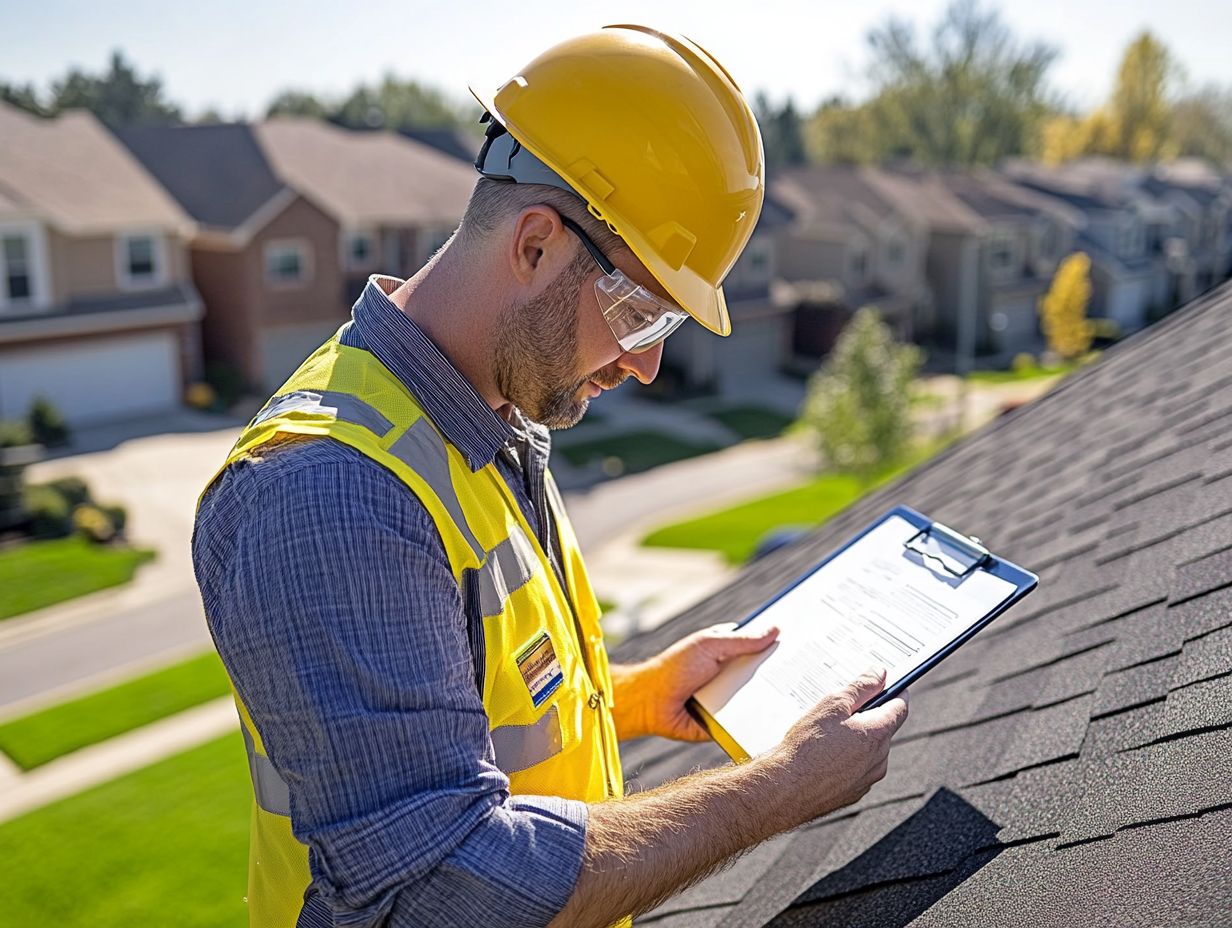
Look for qualifications, experience, certifications, and reputation. Also, ensure they have proper insurance and know local building codes.
How do I find a reputable home inspector?
Ask friends, family, or real estate agents for recommendations. You can also search certified inspectors through organizations like ASHI or NAHI.
What certifications should a home inspector have?
Inspectors should hold certifications from recognized groups like ASHI, NAHI, or InterNACHI. These certifications confirm proper training and adherence to standards.
How much does a home inspection typically cost?
Costs vary based on property size and location. Generally, inspections range from $300 to $500. Remember, quality should come first.
What are some red flags to watch out for when choosing a home inspector?
Watch for lack of certifications, insufficient experience, or poor reviews. Thoroughly research potential inspectors before deciding.
Is it necessary to be present during the home inspection?
While it s not mandatory, being present is highly recommended. This allows you to ask questions and see potential issues firsthand.

